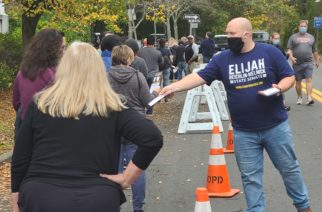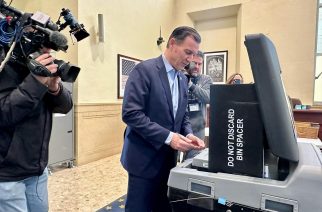
At a recent press conference, a bipartisan group of Hudson Valley officials expressed a dire need for the U.S. Senate to pass a stimulus bill that includes funds for local governments that are struggling to balance their budgets.
On September 9 – the day before the U.S. Senate failed to pass Republican-sponsored economic recovery legislation – Congressman Sean Maloney, Dutchess County Executive Marc Molinaro, Orange County Executive Stephen Neuhaus and Beacon Mayor Lee Kyriacou, said their communities and their constituents need a stimulus bill that includes funds for local governments facing economic stress seven months into the COVID-19 pandemic.
Without dedicated funds, state and local governments will be forced to cut budgets and eliminate vital community services and frontline jobs, like public health care workers, police, fire, transportation, EMS and teachers.
The four officials met in front of the fire department building on Main Street in Beacon to speak to a small group of reporters.
“As you know, the people here are from different layers of government. We don’t agree on everything, but we do agree on math,” Congressman Maloney said. “And that’s why we’re here today: the math.”
According to Maloney, the last time these four men had met was in March to announce the Hudson Valley’s coronavirus preparedness plans.
That impact has hit the Hudson Valley with a “ferocity and intensity that was greater than we could have imagined,” Maloney said.
According to a report by the State Comptroller’s Office, counties throughout New York have lost 20 percent or more in sales tax revenue compared to previous years. On top of the loss of revenue, counties are also facing increased costs. Mayors and county executives have had to purchase personal protective equipment and other supplies, provide additional social services and meals, and other costs associated with navigating a pandemic.
Dutchess County Executive Marc Molinaro stressed the nature of the front-line role that county governments are playing in response to the coronavirus pandemic. Forty percent of all funding for Dutchess County comes from sales taxes, which has dropped significantly this year. The county has reached a nearly $60 million budget shortfall.
Not only are additional COVID-driven services at risk, but so are core services such as 911 dispatchers, road repair, and snow removal. “We will do what is necessary, but it’s time for the Senate to do the same,” Molinaro said.
Molinaro admitted that he and others had never believed that the Heroes Act would become law, but that it was meant to be a starting point for the Senate to build on and announce their plan.
Yet the Senate, “has not come out with anything meaningful” for four long months, he said. Some of the proposed plans by the Republicans have even suggested cutting federal funds to state and local governments by 20 percent temporarily.
However, Molinaro argued that if the cuts went into effect, “they will almost inevitably become permanent.”
Maloney also noted his support for the Heroes Act — the Health and Economic Recovery Omnibus Emergency Solutions Act — which the House passed in May. The bill was the Democratic run House’s plan for a second round of coronavirus funding. New York would be getting an additional $60 billion with 50 percent of that being allocated to county and local governments.
Orange County would receive $260 million over two years, Dutchess County $165 million, Putnam County $55 million, and Westchester County $500 million.
Money would also go to MTA and public transit, which announced it may have to make cuts or layoffs, which Maloney described as “unacceptable.”
The Heroes Act was passed in the House nearly four months ago, but Senate leaders have refused to debate the bill until earlier this month. According to Maloney, the outline of a plan they released did not include a single dollar for local governments. “ We have to do better,” he said.









